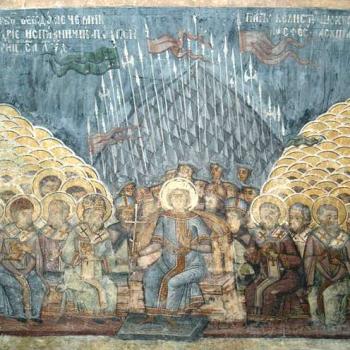By Sandra Lommasson
Note: Each week's reflection is intended for communal examination with at least one other person in a small faith, work, or family community as part of the annual six-week ‘retreat' of Lent. The intent is to notice with freshness our own impact in a community and to name that aloud to others in the community in mutual revelation. See the introduction to the series, "Tending the Communal Laundry," for more on this approach.
 Luke 13:31-35*
Luke 13:31-35*
Luke's community seeks to live as people on the Way of Christ in a setting that doesn't want them or the gift they bear. Outcast by the Jewish community that once held them and outlaw to the Roman state, they live a precarious existence. And yet they live! Actively choosing to be who they are, they mature in prayer and practice, a work that means they too have "set their face to go to Jerusalem" (9:51). The story of Jesus the Christ lives within them as it is meant to live in us as our own experience.
Bearing the gift of transformation into a world that prefers tinkering to core change is a real sacrificial work. The Jesus of this 4th-path Gospel, in which disciples must become apostles, is often fierce in his clarity. Only in Luke does this encounter occur: "At that very hour some Pharisees came and said to him, ‘Get away from here, for Herod wants to kill you.'" Jesus response is simple: "Go tell that fox for me..." (13:31-32a). He names the apparent offer of charity for what it is -- trickery. There is no ‘easier, softer way' on this long road to the heart of the human condition and community epitomized by Jeru-shalom, the City-of-Peace that is wracked by division. It is to this place that our service too must take us if it is authentic service.
The span of the four spiritual movements or paths of transformative journey embodied by the Gospels matures over time and with intentional practice. The first movements are about waking up to God in our life as it is coming apart in the ways we've known it. The later movements are about yielding into generous participation in the God-life already active in this world. In The Hidden Power of the Gospels, Shaia writes:
Since the Journey of Quadratos [the name given to the 4 movements] is about maturing into spiritual transformation, it now becomes very clear why the early church put the Gospel of Luke fourth in the reading sequence. This is a series of teachings specifically designed to expand on the basic truths of the other gospels and to establish a discipline that moves them into everyday life.... If we are able to continue in this path -- or, like the apostle Peter, recover and come back to the path... we increasingly act to accept our responsibilities as part of the Whole. In this way, we genuinely help transform the world, since most of the horrors created by humankind... occur only in the complicity of our silence or non-action. Our burdens therefore increase -- but likewise our joys and our relationships, as well as our opportunities for action and empowerment and service (pp. 252-4).
We must lose our small life to find our participation in the Great Life. And so with Jesus the Christ we engage the work given us in consciousness, step-by-step, day-by-day without naiveté or undue concern for the machinations of worldly power. Herod is named "that fox" but there's no concern about the fox getting into the henhouse; the "hen" of Luke's Gospel journeys into the den of the fox, awake, aware, and full of compassionate intention. With the poignant cry of a mother's heart Jesus cries out.
Jerusalem, Jerusalem, the city that kills the prophets and stones those who are sent to it! How often have I desired to gather your children together as a hen gathers her brood under her wings, and you were not willing! (13:34)
The willingness of the world to receive us matters not; the Christ in us is willing to journey to the center of what knots us as human persons and human community. Compassion sees and names with clarity the result of our condition but does not condemn: "See, your house is left to you" (13:35).
Left how? The Greek word erémos refers to the desolation and loneliness of the desert. Unlike the desert that blossoms in fertility when the 2nd path work of authentic suffering is engaged, this wilderness is barren. The reflexive knotting of the great City of Peace that kills the prophetic voice is a self-protective grasping backward to hold on to what is already dying. The yield is emptiness.




